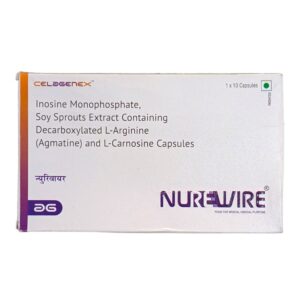L-CARNOSINE + INOSINE MONOPHOSPHATE + AGMATINE SULPHATE
L-Carnosine: L-Carnosine, also known as β-alanyl-L-histidine, is a naturally occurring dipeptide composed of the amino acids beta-alanine and histidine. It is found abundantly in various tissues of the human body, including the brain, muscles, and heart. L-Carnosine is primarily known for its antioxidant and anti-aging properties.
L-Carnosine is commonly used as a dietary supplement to support overall health and well-being. It is believed to have several beneficial effects on the body. Firstly, it acts as an antioxidant, helping to neutralize harmful free radicals and protect cells from oxidative stress. This can potentially help prevent damage to cells and tissues.
Secondly, L-Carnosine is known to have anti-glycation properties. Glycation is a process in which sugar molecules attach to proteins, leading to the formation of harmful compounds called advanced glycation end-products (AGEs). These AGEs can cause damage to various organs and tissues in the body. L-Carnosine helps inhibit this process by preventing the formation of AGEs, thus protecting against the detrimental effects of glycation.
In addition to its antioxidant and anti-glycation activities, L-Carnosine has been found to have other potential health benefits. It may improve brain health and cognitive function by reducing oxidative stress and promoting the normal functioning of neurotransmitters. It can also support cardiovascular health by reducing lipid oxidation and inflammation.
The recommended dose of L-Carnosine varies depending on the individual and the specific health goals. However, typical doses range from 500 mg to 2000 mg per day, divided into two or three doses. It is advisable to consult with a healthcare professional to determine the appropriate dosage for your specific needs.
L-Carnosine is generally considered safe for most individuals when taken in appropriate doses. Side effects are rare but can include mild gastrointestinal symptoms such as nausea, stomach cramps, or diarrhea. Since L-Carnosine may affect blood sugar levels, individuals with diabetes should monitor their blood glucose levels closely when taking this supplement. As with any new supplement or medication, it is always recommended to consult with a healthcare professional before starting L-Carnosine.
Inosine Monophosphate: Inosine Monophosphate (IMP) is a nucleotide drug that is used primarily as a dietary supplement. It is a natural substance found in some foods, such as meat and fish.
The primary use of IMP is to enhance athletic performance and muscle strength. It is often used by bodybuilders and athletes to increase their endurance, improve recovery time, and enhance muscle growth. However, its effectiveness as a performance enhancer is still under debate, and more research is needed to fully understand its benefits and risks.
IMP works by increasing the production of adenosine triphosphate (ATP) in the body. ATP is the primary source of energy for cells, and by increasing its levels, IMP may improve energy production and performance during exercise.
The recommended dosage of IMP varies depending on the individual and the specific purpose of use. As a dietary supplement, it is typically taken in doses ranging from 1 to 3 grams per day. However, it is essential to follow the instructions on the product packaging or consult a healthcare professional for proper dosage guidance.
While Inosine Monophosphate is generally considered safe for most people when taken in the recommended doses, it can have some side effects. Common side effects may include stomach upset, diarrhea, nausea, and headache. In rare cases, some individuals may experience allergic reactions or gout-like symptoms due to its purine content.
It is crucial to note that Inosine Monophosphate should not be used as a substitute for a balanced diet or proper training regimen. It is always advisable to consult a healthcare professional before starting any new dietary supplement or exercise program to ensure it is safe and suitable for individual needs.
Agmatine Sulphate: Agmatine Sulphate is a naturally occurring substance derived from the amino acid L-arginine. It is commonly used as a dietary supplement. Here is some information about Agmatine Sulphate:
Use: Agmatine Sulphate is primarily used as a nootropic supplement to enhance cognitive function, memory, and focus. It has also been used to promote muscle growth, improve athletic performance, and alleviate pain and depression. Some studies suggest that it may have neuroprotective and antioxidant properties.
Mechanism of Action: The exact mechanism of action of Agmatine Sulphate is not fully understood. It is believed to work by modulating nitric oxide synthesis, neurotransmitter release, and ion channel activity in the brain. It may also influence several signaling pathways involved in neuronal communication.
Dose: The recommended dose of Agmatine Sulphate for cognitive enhancement or athletic performance is typically 500-1000 mg per day. It is often taken in divided doses throughout the day. However, the optimal dose may vary depending on the individual and the intended use. It is always recommended to start with a lower dose and gradually increase to assess individual tolerance.
Side Effects: Agmatine Sulphate is generally considered safe when taken in the appropriate doses. However, some individuals may experience mild side effects such as gastrointestinal discomfort, dizziness, or headaches. It is important to note that high doses or prolonged use of Agmatine Sulphate may cause potential adverse effects, including hypotension (low blood pressure) and interactions with certain medications.
It is important to consult with a healthcare professional before starting any new dietary supplement, especially if you have any pre-existing medical conditions or are taking other medications. They can provide personalized advice and guidance based on your individual circumstances.

